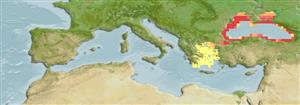Environment: milieu / climate zone / depth range / distribution range
ນິເວດວິທະຍາ
ສັດທະເລ; ນ້ຳຈືດ; ນ້ຳກ່ອຍ ອາໄສຢູ່ໃກ້ໜ້າດິນໃຕ້ພື້ນທ້ອງນ້ຳ; ປາທີ່ມີການເຄື່ອນຍ້າຍຈາກທະເລ ແລະ ໄປໄຂ່ຢູ່ນ້ຳຈືດ (Ref. 51243); ລະດັບຄວາມເລິກ 10 - 100 m. Temperate; 10°C - 20°C (Ref. 2059); 61°N - 36°N, 13°E - 54°E
Eurasia: Caspian, Black, Azov and Aegean Seas, ascending rivers to spawn. Occurrence in Albania needs confirmation. Introduced in Aral Sea. Artificially propagated (Ref. 6866). Probably extirpated from Aegean Sea and related river basins (Ref. 113969).
Length at first maturity / ຂະໜາດ / ນ້ຳໜັກ / Age
Maturity: Lm ?, range 120 - ? cm
Max length : 250 cm TL ຕົວຜູ້/ບໍ່ມີເພດ; (Ref. 98365); common length : 125 cm TL ຕົວຜູ້/ບໍ່ມີເພດ; (Ref. 3397); ນ້ຳໜັກສູງສຸດທີ່ເຄຍຈັດພີມມາ: 80.0 kg (Ref. 9988); ອາຍຸສູງສຸດທີ່ເຄຍລາຍງານມາ: 29 ປີ (Ref. 126409)
ຄີ (ໜາມ)ແຂງຢູ່ຫຼັງປາ (ທັງໝົດ) : 0; ຄີຫຼັງຂອງປາ (ຄີອ່ອນ) (ທັງໝົດ) : 40 - 46; ຄີກົ້ນຂອງປາ: 24 - 29. Snout long, pointed at tip. Lower lip not continuous, interrupted at center. Barbels short not reaching mouth but nearer to it than to tip of snout. Five rows of scutes, dorsal 11-14, lateral 30-36 on each side, ventral 10-11 on each side, with small bony stellate plates and smaller grains between main scute rows. Back dark grey to almost black, flanks lighter, belly white.
At the sea, it occurs in coastal and estuarine zones and forages on the bottom mostly on clayey sand and intensively in the middle and upper water layers (Ref. 59043). Found mainly near shore over sand and mud, stays at the bottom during the day and rises to the surface to feed at night. Feeds mainly on fish, also mollusks, crustaceans and worms (Ref. 3193). Spawns in strong-current habitats in main course of large and deep rivers, on stone or gravel bottom. Spawning also takes place on flooded river banks and if gravel bottom is not available, on sand or sandy clay. Juveniles stay in shallow riverine habitats during first summer (Ref. 59043). One of the three most important species for caviar; also utilized fresh and frozen; eaten pan-fried, broiled and baked (Ref. 9988). Overfishing at the sea for meat and caviar will soon cause extinction of the natural populations and their survival can only depend on stocking (Ref. 59043).
Bauchot, M.-L., 1987. Poissons osseux. p. 891-1421. In W. Fischer, M.L. Bauchot and M. Schneider (eds.) Fiches FAO d'identification pour les besoins de la pêche. (rev. 1). Méditerranée et mer Noire. Zone de pêche 37. Vol. II. Commission des Communautés Européennes and FAO, Rome. (Ref. 3397)
IUCN Red List Status (Ref. 130435)
Threat to humans
Harmless
Human uses
ການປະມົງ: ເປັນສີນຄ້າ; ການລ້ຽງສັດນ້ຳ: ເປັນສີນຄ້າ; ຕູ້ປາ: ບ່ອນວາງສະແດງສັນນ້ຳຂອງລັດ
ເຄື່ອງມື
Special reports
Download XML
ແຫຼ່ງອີນເຕີເນັດ
Estimates based on models
Preferred temperature (Ref.
123201): 7.6 - 15.9, mean 13.1 °C (based on 66 cells).
Phylogenetic diversity index (Ref.
82804): PD
50 = 0.5000 [Uniqueness, from 0.5 = low to 2.0 = high].
Bayesian length-weight: a=0.00562 (0.00341 - 0.00928), b=3.03 (2.89 - 3.17), in cm total length, based on LWR estimates for this species & Genus-body shape (Ref.
93245).
ຊັ້ນເຂດຮ້ອນ (Ref.
69278): 3.5 ±0.2 se; based on diet studies.
ຄວາມຢືດຢຸ່ນ (Ref.
120179): ຕຳ່, ປະຊາກອນຕຳ່ສຸດທີ່ໃຊ້ເວລາສອງເທົ່າ 4.5 - 14 ປີ (K=0.06; tm=9; tmax=27; Fec=20,000-360,000).
Fishing Vulnerability (Ref.
59153): Very high vulnerability (85 of 100).
Climate Vulnerability (Ref.
125649): Moderate to high vulnerability (51 of 100).
Nutrients (Ref.
124155): Calcium = 16.8 [10.4, 28.3] mg/100g; Iron = 0.271 [0.168, 0.429] mg/100g; Protein = 17.8 [15.3, 20.4] %; Omega3 = 0.385 [0.222, 0.665] g/100g; Selenium = 23.5 [13.0, 45.4] μg/100g; VitaminA = 4.05 [1.55, 10.74] μg/100g; Zinc = 0.409 [0.299, 0.552] mg/100g (wet weight);
